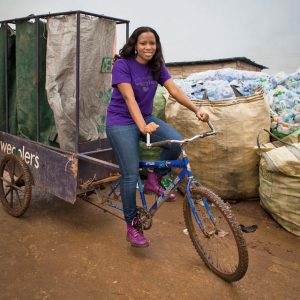An award-winning social entrepreneur who has built a sustainable and viable business model to help the poor communities of Lagos reclaim their neighborhoods from the scourge of pollution and waste.
“In terms of social impact, it is really making a difference at street level. There is less pollution and less flooding. People say their neighbourhoods are cleaner and their kids seem healthier.”
Bilikiss Adebiyi-Abiola and her cofounders started WeCyclers in 2012, using low cost cargo bicycles called WeCycles to provide convenient recycling services to households across Nigeria. Although born and raised in Lagos, Bilikiss initially developed the idea for her business in the US whilst she was a student at the MIT Sloan School of Management. This followed a five-year career as a corporate software engineer at IBM where she gained invaluable business and technology experience. Whilst at MIT, she was assigned to a study project aimed at finding solutions to tangibly help people at the bottom of the social pyramid. In Nigeria, about 70 per cent of Nigerians are at the base of the pyramid and are very poor; they don’t have basic sanitation; they don’t have basic healthcare, and she wanted to do something that would impact that segment. She was also very interested in waste because as a Nigerian, waste is something she saw everywhere and she wanted to solve that problem, Going back to her country roots in Nigeria, Bilikiss was inspired to work on finding a much-needed and effective new solution to the problem of waste management. Her project, which eventually became the inspiration for her company WeCyclers, was a practical response to dealing with huge local waste issues in Lagos, where only 40 percent of the city’s garbage is collected.
“The “AHA” moment for pursuing Wecylcers started from a class that exposed students to the plight of people below the pyramid; and there are many in Nigeria. There are so many case studies that pertain to Nigeria and finding a way to solve some of these problems was important.”
WeCyclers is a successful initiative that enables low-income communities in Nigeria to make money from the waste piling up in their streets. The company deploys a fleet of cargo bicycles to collect and recycle this unmanaged waste in Nigeria’s capital, Lagos. Every week, these bicycles go around people’s homes picking up a variety of plastics, cans and sachets. The residents receive points based on the weight of recyclables they collect, which they can redeem for basic food items, consumer electronics, or even cash. This is a highly effective, accessible and low-tech, but high impact, recycling scheme that is a win-win for all involved. The company, which works in partnership with the Lagos Waste Management Authority, makes its money by selling the materials on to manufacturers. The plastic collected eventually gets shredded and exported to make polyester fibre for clothing, pillow and mattress stuffing, and trash bags.
“I really believe this is the best time to be an African start up. This is Africa’s time and we as Africans need to seize this opportunity to contribute our quotas to our respective countries.”
More than 5,000 households have already signed up for the service and there are plans to extend the initiative to other cities throughout Nigeria. Bilikiss sees huge potential in this sector, with Nigeria’s recycling plants in dire need of end products. Her initiative has also created employment for hundreds of young people in Lagos, and is helping to foster enterprise in other new areas. Today, WeCyclers directly employs 52 staff, but Bilikiss thinks the Nigerian recycling sector could create 500,000 jobs once it has been fully developed. The majority of this rapidly growing company’s staff makes up a fleet of cargo bicycles that collect the recyclable waste of two communities in Lagos: Ebute-Metta and Itire, Surulere, with populations of 700,000 and 250,000 respectively. To fund the first steps in this expansion direction, Wecyclers is raising US$ 2 million for the initiative. This much needed investment will provide essential processing machines so that the company can add more value to sales, attract really smart people passionate about change, and gradually build the capacity to once and for all make an end to the waste problem of Lagos! As a result, WeCyclers will become a world-leading leading example of a solution that empowers its community to lead healthier, wealthier and more sustainable lives.





1 comment
Muchos Gracias for your blog.Really looking forward to read more. Will read on…